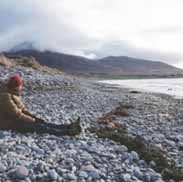Psychology Chapter 2 Test Questions – Flashcards with Answers
Unlock all answers in this set
Unlock answersquestion
neuron
answer
an individual nerve cell
question
dendrites
answer
neuron fibers that receive incoming messages
question
soma
answer
the main body of a neuron or other cell
question
axon
answer
fiber that carries information away from the cell body of a neuron
question
axon terminals
answer
bulb-shaped structures at the ends of axons that form synapses with the dendrites and somas of other neurons
question
action potential
answer
the nerve impulse
question
neural network
answer
interlinked collections of neurons that process information in the brain
question
neuroplasticity
answer
the capacity of the brain to change in response to experience
question
central nervous system
answer
CNS- the brain and spinal cord
question
peripheral nervous system
answer
PNS- all parts of the nervous system outside the brain and spinal cord
question
autonomic nervous system
answer
ANS- the system of nerves carrying information to and from the internal organs and glands
question
self-directed neuroplasticity
answer
every time you learn something, you are reshaping your living brain.
question
spinal cord
answer
connects the brain to other parts of the body
question
spinal nerves
answer
major nerves that carry sensory and motor messages in and out of the spinal cord
question
cranial nerves
answer
major nerves that leave the brain WITHOUT passing through the spinal cord
question
sensory neuron
answer
a neuron that carries information from the senses toward the CNS
question
electrical stimulation of the brain (ESB)
answer
direct electrical stimulation and activation of brain tissue
question
localization of function
answer
the research strategy of linking specific structures in the brain with specific psychological or behavioral functions
question
electrode
answer
any device (such as a wire, needle, or metal plate) used to electrically stimulate or destroy nerve tissue or to record its activity
question
neurological soft signs
answer
subtle behavioral signs of brain dysfunction, including clumsiness, an awkward gait, poor hand-eye coordination, and other perceptual and motor problems
question
functional MRI
answer
MRI technique that records brain activity
question
cerebral cortex
answer
the outer layer of the brain
question
cerebral hemispheres
answer
the cortex is composed of two sides, or cerebral hemispheres, connected by a thick band of axon fibers called the corpus callous. damage to one hemisphere may cause spatial neglect
question
primary motor area
answer
primary motor cortex- a brain area associated with control of movement
question
association areas of the cerebral cortex
answer
all areas of the cerebral cortex that are not primarily sensory or motor in function
question
aphasia
answer
a speech disturbance resulting from brain damage
question
frontal lobes
answer
areas of the cortex associated with movement, the sense of self, and higher mental functions
question
mirror neuron
answer
a neuron that becomes active when a motor action is carried out and when another organism is observed carrying out the same action
question
prefrontal cortex
answer
the very front of the frontal lobes; involved in sense of self, reasoning, and planning
question
primary somatic sensory cortex
answer
a receiving area for body sensations
question
receptive aphasia
answer
if Wernicke's area is damaged, it serves as a language site, it will result in receptive (or fluent) aphasia. although the person can hear speech, they have difficulty understanding the meaning of words.
question
facial agnosia
answer
an inability to perceive familiar faces
question
reticular activation system (RAS)
answer
a part of the reticular formation that activates the cerebral cortex
question
reticular formation
answer
RF- a network within the medulla and brainstem; associated with attention, alertness, and some reflexes
question
hypothalamus
answer
a small area of the brain that regulates emotional behaviors and motives
question
amygdala
answer
a part of the limbic system associated with fear responses
question
hippocampus
answer
a part of the limbic system associated with storing memories.
question
limbic system
answer
a system in the forebrain that is closely linked with emotional response
question
brainstem
answer
the lowest portions of the brain, including the cerebellum, medulla, pons, and reticular formation
question
thalamus
answer
relay station to cortex for sensory information
question
pituitary gland
answer
the "master gland" of the endocrine system. a brain structure that relays sensory information to the cerebral cortex. hormones influence other endocrine glands. regulates growth and lactation; regulates activity of other glands
question
melatonin
answer
hormone released by the pineal gland in response to daily cycles of light and dark



